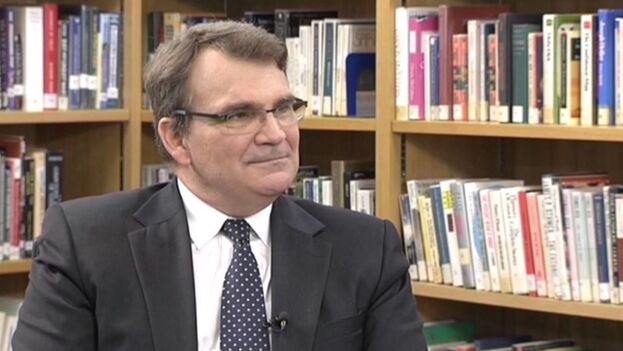
![]() 14ymedio, Madrid, 1 February 2023 — The US charge d’affaires in Havana, Benjamin Ziff, recounted in an interview with the Associated Press that talking about human rights with the Cuban authorities is very complicated and that there have been arrests of opponents with whom his embassy wanted to meet, although he declined to give names.
14ymedio, Madrid, 1 February 2023 — The US charge d’affaires in Havana, Benjamin Ziff, recounted in an interview with the Associated Press that talking about human rights with the Cuban authorities is very complicated and that there have been arrests of opponents with whom his embassy wanted to meet, although he declined to give names.
“It is our number one priority, to ensure that the Cuban population can have a future without repression and with economic hope,” Ziff alleges, however he is very clear when it comes to putting the fate of Cuba in the hands of its own citizens.
“The change in Cuba comes from Cuba, from the Cubans, it does not depend on anyone else. The United States can support, help, encourage, advocate, pressure, everything, but basically the future of Cuba depends on the Cubans,” he says.
A few days have passed since the visit to the Island of two members of the Delaware state government who, from Havana, asked President Biden to return to a thaw like that of 2014. “The hope is that eventually we can return to where we were in the Obama times,” said Democrat Michael Scuse. Ziff, however, sets out why “it’s hard to go back,” as he puts it.
“The world has changed since Obama’s time and now we have to deal with the world of today,” he says. The senior official indicates that the Biden Administration is taking measures in areas that he considers can improve the lives of families, but confesses there are tensions with the regime.
“The relationship with the United States for historical reasons, political reasons, human rights reasons, is difficult,” says the diplomat, who defines it as correct and pragmatic.
During the Obama administration, the embassies in Washington and Havana were reopened, travel from the US to the island was authorized in various categories, as well as commercial flights between the two countries and direct money transfers. In addition, some measures were taken that stimulated commercial exchange or, at least, its expectations.
However, the arrival of Donald Trump to the presidency reversed the situation: flights were halted, the provision of consular services was reduced to a minimum, remittances were prohibited and, most importantly, Cuba was once again included on the list of countries that sponsor terrorism, from which it has not yet emerged despite the expectations created by the change of Administration in 2020, fueled by the fact that Joe Biden was Obama’s vice president.
Ziff touches on another of the core issues of diplomacy between the two countries: emigration, which has become a priority issue for the US, with more than 310,000 Cubans arriving in the United States in 2022. This represents the highest number in history, including the 1980 Mariel Boatlift, during which roughly 125,000 Cubans arrived.
“The lack of hope is what is driving the rate of irregular migration,” says Ziff, who confirms that the authorities still do not accept repatriations from Cuba but will do so “soon” if they fulfill their commitment.
____________
COLLABORATE WITH OUR WORK: The 14ymedio team is committed to practicing serious journalism that reflects Cuba’s reality in all its depth. Thank you for joining us on this long journey. We invite you to continue supporting us by becoming a member of 14ymedio now. Together we can continue transforming journalism in Cuba.
